|
By Nick Wiley (featuring Cameron Fitzpatrick) See the Triumph Guest Bloggers Amongst an ocean of infinitely more well-qualified authors, I’ve found myself the recipient of an open invitation to write about something I hope will be fresh and interesting to the readers of See the Triumph. In that vein, I’d like to begin with a quick disclaimer: I am, by no means, an expert (or even mildly knowledgeable) on the subject of sexual assault. Rather, I am a musician who has found himself in the midst of a project that has been fortunate enough to catch the eye of some local charitable organizations and I’m here to tell the beginning of our tale. I believe a little back-story is in order. My name is Nick Wiley and I’ve been a semi-professional musician for around half of my twenty-six years on earth. When I’m not playing guitar, I make a living as an IT professional and help out when I can at a small Anglican church plant in my home of Asheboro, NC. Since 2006, I’ve played in bands with my brother Stephen (drummer) and, by way of several projects along the way, we reconnected with bassist/vocalist Cameron Fitzpatrick about a year ago and formed our current band, Kindler. Early this year we began exploring the possibility of producing a music video for one of the tracks from our debut EP “Afterglow.” It was decided very quickly that “Shifting Ground” would be made into our first video because it has an immediately palatable and vivid story along with catchy melodies. Cameron, who wrote the lyrics, had this to say about it:  “’Shifting Ground’ is a song about triumph. I took inspiration from a true story and my distance from the event gave me the idea to tell the story as if the narrator was watching things take place from afar. Lyrically, I did not want to focus on the event or the trauma it caused; rather, I wanted to highlight the strength of the main character throughout her story. She finds herself dealing with a terrible course of events and falling into despair, but her eventual triumph is what matters. My hope is that the song speaks to anyone who has experienced violence or trauma, either directly or through a loved one, and that it will give them some comfort and strength in knowing that they are not alone in their struggles and that the end is always in sight.” On April 25, 2014, we released our debut music video “Shifting Ground” at a live premiere in Greensboro, NC and made it available via YouTube.com to the free world. Right before the release we showed the video to some local charities and ended up partnering with the Randolph County Family Crisis Center to dedicate the video premiere to National Sexual Assault Awareness Month. See the YouTube video below, or click here to watch “Shifting Ground.” Click here for lyrics. As artists, we often find ourselves the recipients of varied opportunities to use our platform as a voice to speak out about political and social issues. Much like Switzerland, Kindler’s default policy is to remain quiet and neutral in an effort to not isolate potential fans or make them feel uncomfortable. Sexual assault is an issue that is so innately senseless and wrong that we immediately made the choice to abandon our policy of neutrality without hesitation. I heard the other day that there is actually someone on staff with the state who crunches numbers and probabilities to determine an acceptable number of casualties when road construction is necessary. I don’t need a degree in civil engineering to be able to look at that situation and say that something is wrong and broken. When did it become socially acceptable to put tax dollar savings and driving inconvenience above human life? For me, sexual assault is the same way. I don’t have to be an expert on the subject to know that it needs to stop and that there is no point at which we should become satisfied until sexual assault has become a historical fact and not a present reality. There is no set of statistics that we should look at and be satisfied with until the numbers begin to look a whole lot more like zeros. To victims, families, professionals, and anyone affected by sexual assault and domestic violence: it is my sincere hope that this music video will serve as an inspiration to you and provide you with comfort and solace. To the perpetrators, enablers, and criminals: I hope this video conjures a never-ending and undeniable feeling of discomfort like ants beneath your skin. One day this fight will end and you are fighting on the losing side.  Nick Wiley (guitar) and Cameron Fitzpatrick (bass/lead vocals) make up two-thirds of Kindler, a progressive/experimental rock band in the style of Rush, Tool, Mastodon, and YES. The trio was founded in 2013 and is completed by Nick’s brother, Stephen Wiley (drums.) Kindler’s well-reviewed debut EP “Afterglow” was released in August, 2013 and was followed by a heavy tour schedule beginning in early 2014. In April, Kindler released its debut music video “Shifting Ground” in association with several local charities as a vessel for their promotional efforts during Sexual Assault Awareness Month. Kindler will return to the studio in late June, 2014 to record their first full-length LP. For more information, visit http://www.kindlerband.com By Christine Murray, See the Triumph Co-Founder
All this month, we’ve focused on parenting toward nonviolence. We couldn’t let this month end without addressing an important topic about children and violence. Today we’re focusing on how children are impacted when they experience domestic violence in their homes, and what steps can be taken to ensure that children are safe and supported. When children witness domestic violence in their homes, they face many potential challenges that may occur throughout their lives. There are many ways that children can be impacted when they’re living in a violent home. According to the New Hampshire Coalition Against Domestic Violence, these include being abused themselves in addition to witnessing violence, being used as part of abuse tactics the abuser uses, and by making it more difficult for the parent victim to parent effectively. Would you know the signs to indicate that a child you know has experienced domestic violence in their home? The organization, Children of Domestic Violence, provides a useful chart that shows that the indicators can show up in many ways in children’s lives, including their behaviors, emotions, and social relationships. In many jurisdictions, children witnessing domestic violence is considered a form of neglect and is required to be reported to Child Protective Services. The US Department of Health and Human Services, through its Child Welfare Information Gateway, provides a useful resource for understanding the laws in your area. It’s important for professionals and community members to know and understand their legal obligations, as well as resources for helping to support the children in their lives who’ve been impacted by domestic violence. My colleagues and I in the Family Violence Research Group at the University of North Carolina at Greensboro recently developed a safety planning resource, Safety Strategies, for professionals to use when working with clients impacted by domestic violence. We based this resource on a series of 9 focus groups that we conducted with professionals in domestic violence agencies to learn about safety risks and safety planning related to domestic violence. We heard some great information from the professionals in our focus groups that help us understand how to think about children’s safety in the context of domestic violence. First, the professionals reminded us that it’s important for parents (and other adults) ultimately to be responsible for children’s safety. Young children especially should not be expected to keep themselves safe. However, it’s possible to do some basic safety planning with children to help them learn ways to become safer if violence occurs. This safety planning must be done in a developmentally-appropriate manner, using words and behaviors that match the child’s capabilities and understanding of the situation. Some of the strategies that adults can review with children include how to call 9-1-1 and developing a code word or sign to let neighbors or others know that they need help. It’s also important to help children connect with adults and friends with whom they can talk and share their feelings. This may be a non-offending parent, an extended family member, a teacher, neighbor, coach, or other trusted adult. Children also may benefit from counseling, especially play therapy, to help them process their emotional responses to the domestic violence. Children who have experienced violent homes need a lot of support and resources, including positive, trusting relationships with supportive adults, opportunities to be involved in activities where they can discover their strengths, connections with peers and community organizations, and relationships in which they can tell their stories and feelings. We can all help to promote safe, healthy families and communities for children. If you’re interested in learning more, I encourage you to connect with our partner, the Stop Abuse Campaign, in their campaign to give children the right to a safe home to grow up in. By Rachel Miller, See the Triumph Contributor
As a survivor of domestic violence and mother of two, one of my biggest concerns is how the abusive home in which they grew up – and in which they now spend every other weekend – will affect them. I know the statistics around how children from abusive homes are more likely to become abusers or victims themselves. I’m determined to make sure that the cycle does not perpetuate itself with my children. How to actually do that was not always very clear to me, especially since they still have visitation with their father. Additionally, there is this thing that is drilled into the heads of divorcing parents, “never badmouth your ex to your child. They are still your children’s parent and they have a right a good relationship with them.” While I am not dismissing that advice, it does not take into consideration the issues those of us dealing with abusive exes have. We live in a very different reality than other types of divorcing parents. When I left my abusive marriage, or more truthfully, once I was in therapy and began the healing process, I promised myself that I would never again live a life of lies and secrets and I most certainly would not lie for my ex or cover up his behaviors any longer. Honesty, authenticity and openness, especially with my children, became mandatory for me. Trying to figure out how to balance that with all of the co-parenting mandates that the family courts thrust on divorcing parents was a challenge. It felt like I was walking a tight rope. Many of my children’s father’s behaviors and attitudes were not ones I was going to tolerate in our new home. Much of his treatment of them was unacceptable and hurtful. Then we also had to deal with how his behavior rubs off on them. Either by imitation, irritation or exhaustion, they would think they could speak to and treat me and each other more harshly when they returned home from their father’s house. How on earth is a mother, who is trying to raise her children to understand that abuse and violence are wrong, supposed to do that while they spent a large portion of their time in an environment where both were considered perfectly normal, even celebrated? Self-Care and Boundaries I was initially overwhelmed by the whole idea, but slowly started to lay some groundwork that would eventually move all of us forward into the healthy and respectful place we are today. That work included: · I began by working hard on myself to ensure that I was setting the example and modeling the kind of behavior I wanted them to emulate. This wasn’t always easy. I was struggling with PTSD and their behaviors would often act as triggers. The more like their dad they sounded or acted, the more likely I was to react, instead of respond. This was how I knew that I had to start with me. · I had to learn how to deal with my triggers, how to set healthy boundaries, how to stay out of the kids’, and their dad’s, drama triangles and not create my own. Becoming a whole, healthy, non-violent person was the best way to show my children that, not only is it possible to live and be different than what we had been and lived with, in the past, but also that doing so is desirable. I do not pretend that any of that this wasn’t difficult or that I did so quickly or without incident. It was work. A lot of challenging, personal work, but I needed to do it for myself and them. I needed to ensure that I was practicing what I was preaching. In conjunction with my work on myself, there were some basic ground rules put in place in our home that are never negotiable. These are the rules through which all behaviors are filtered
Both of these rules were initially difficult for the kids as they spent 50 percent of their time with their father, who was consistently telling them to lie to me and who never respected anyone. These were seriously mixed messages for a 10- and 13-year-old. When one of your parents says “What happens in this house, stays in this house” and “We have a triangle of trust between the three of us and you must not break it” while the other parent is telling you the importance of openness, honesty, respect and integrity, it can be very confusing. For me it felt like every time we made a little progress, they had to go back to their dad’s and would come home right back where we started, if not worse. Something had to change, if I was going to keep my children from growing up to be statistics. Honesty and Openness Luckily for me, our final mediation meeting resulted in my having the children about two thirds of the time despite the 50/50 custody agreement. Once the children were spending less time with him I had the opportunity to teach them why their father’s attitudes and behaviors were not things they should be emulating. Now some might feel, and many have told me, that these conversations constituted “bashing” their dad. To me my children needed to understand what abuse was, the reasons it was unacceptable and how to protect themselves from their dad’s manipulation. As survivors, I believe we have an obligation to our children to stand up, tell the truth of what happened to us, even if that truth puts the other parent in a bad light. We have the right to help our children protect themselves while in the care of their abusive parent. Doing so without “bashing” the other parent can, like I said, feel like walking a tight rope, but it is possible to accomplish. Focusing on the behaviors, rather than the individual, explaining the cycle, pointing out patterns without calling names or making the child feel badly about still loving their parent are imperative to making your point, without alienating your child from their other parent. We can be open and honest without being accusatory or nasty. When you see teaching moments, take them, even if the example of the bad behavior is their parent. Children are smarter and far more perceptive than people like to give them credit for; they will understand, if the information is presented in the right way. How can we expect children to grow up differently than their abusive parent or avoid becoming the partner of an abuser, if we never explain the dynamics of abuse and abusive relationships? Abusive behavior patterns and victim mentalities can become rooted in the brain at a very early age. Providing children with age appropriate information can empower them to challenge what might seem normal and acceptable to them otherwise. Examples and Mentors Another key piece to helping children of survivors grow up to be non-violent adults or becoming victims themselves, in my experience, is to surround them with solid examples of healthy adults and healthy relationships. Some of the most meaningful changes, in both behaviors and attitudes that I have seen in my children have happened because of the relationships they’ve developed with some truly incredible adults. Exposure to and time spent with different types of people, most specifically, kind, generous, patient, respectful, intelligent men and strong, intelligent, empowered women, have provided my children with examples of people they want to be like. They now understand that strength lies in compassion, not control. They now believe that showing empathy, kindness and respect are not a sign of weakness but of being a good person. They now grasp that they have the power to choose their own behavior and can choose to avoid abusive patterns. Providing them with great role models has allowed them to draw their own conclusions about who they want, and don’t, want to be when they grow up. The kids and I have been gifted with an incredible extended family through my new relationship, one that has forever altered the course of their lives by providing them with wonderful examples of what it means to be a healthy family. This, in addition to the healthy relationship they now witness between me and my boyfriend, and many other members of his family and our core group of friends, provides them a road map for a healthy future. One that I know I was not given growing up and that I can already see making a difference in my kids. Raising children who began life in an abusive environment, when you yourself were a victim of that abuse as well can be a daunting task, but when you practice self-care first, to ensure that you are able to give your kids what they need, when they need it and provide a healthy example, set healthy boundaries for both yourself and them while surrounding them with people that are worthy of emulating, you stand a much better chance of helping them grow up to be non-violent adults who are also able to avoid becoming victims. As survivors we have different parenting experience, with different concerns and obligations than many of the parents we know. That’s okay. Not everyone will or needs to understand why we do the things we do or make the choices we make, because at the end of the day this journey is ours. You are doing the best you can with where you are and what you know in the moment, just like everyone else. What's the impact of witnessing domestic violence on children? This video from the Women's Crisis Services of Waterloo Region shares the perspectives of child witnesses through their pictures and words. It's hard to watch and hear the things the featured kids witnessed. But, it's also important to understand how children can be impacted. Children need safety and support--this video is a call to action to help ensure that all children have safe homes to grow up in.
By Evette Horton, See the Triumph Guest Blogger Many parents who are leaving a violent or abusive home environment struggle with the decision to take their children away from another primary caregiver, i.e., their father, or other caregiving partner. One of the biggest questions I get from parents who have left an abusive situation is, “Should I have taken my children away from their father?” Parents often feel guilt about taking their children away from a partner and unsure if they’ve done the right thing. Though every situation is different, one can generally say that moving children away from a violent and abusive environment is one of best protective factors for a child’s development. In order for children to learn, grow, and be emotionally healthy, they need safety. Their brains literally cannot function or grow to optimal levels when they are living in unsafe environments. The violent and abusive environment raises stress hormones in the child’s developing brain which keeps the brain in a high alert state, instead of a learning state. The longer the children stay in these toxic environments, the more potential damage to their developing brains. Children of all ages are impacted by these toxic environments. A recent study found that infants, even when they were asleep, were absorbing the hostile interactions by their caregivers and had signs of elevated stress. Even if the violence doesn’t happen very often, just overhearing arguments, feeling the tension in the house, or worrying about the next violent event, is enough to make children of all ages feel stressed. When a parent is able to move a child to a place of safety, the stress hormones in the child’s brain can start decreasing and over time, and can return to a normal developmental level, which protects the child’s development. I have seen children flourish in just a few weeks of being in a safe, nurturing environment. Being in a safe place also helps the parent victim begin to feel safe, which helps her have more energy available for parenting. Standard mental health protocol recommends that all children exposed to domestic violence be assessed by a mental health provider with experience working with children exposed to domestic violence. There are providers who can assess and treat children of all ages, including infants. These providers evaluate how the child is socially and emotionally developing, and if they have any concerning symptoms, such as those seen in post-traumatic stress disorder. This is important because children exposed to domestic violence can have a variety of responses. Some responses are easy to see, such as acting out and anger issues; while, some symptoms are tougher to see in children, such as anxiety and depression. We have effective treatments for all of these symptoms and an experienced counselor can be a big help. Removing a child from an environment where domestic violence is present is a big step toward promoting safety, trust, and a healthy developmental environment for a child. Often, it also puts children near other supportive community members and caring adults which are also protective factors for children. Working with a mental health provider gives the parent a better understanding of how the domestic violence may have impacted their child, thereby increasing the parent’s skills and sensitivity around the issue. This is yet another protective factor for children. Though it’s hard to leave an abusive partner, it is important to understand that for children, safety is paramount and moving to a safer environment is one of the best gifts you can give a child. Yes, the child may be upset about leaving a caregiver. This can be a normal reaction to a difficult situation; however, letting your child know you made a choice that would keep you and your child safe, will eventually help them understand the situation, feel safer in the long run, and ultimately recover from living in a stressful environment.  Evette Horton, Ph.D., NCC, LPCS, is a Child and Maternal Therapist at UNC Horizons program, www.unchorizons.org . She works daily with mothers and children exposed to substance abuse and domestic violence. She teaches parenting classes and provides social-emotional assessments and treatment for children ages birth to twelve. If you’d like to suggest any parenting topics that you'd like to suggest that Evette address here on the See the Triumph blog, please leave those suggestions in a comment below. |
Archives
July 2024
CategoriesAll About Intimate Partner Violence About Intimate Partner Violence Advocacy Ambassadors Children Churches College Campuses Cultural Issues Domestic Violence Awareness Month Financial Recovery How To Help A Friend Human Rights Human-rights Immigrants International Media Overcoming Past Abuse Overcoming-past-abuse Parenting Prevention Resources For Survivors Safe Relationships Following Abuse Schools Selfcare Self-care Sexual Assault Sexuality Social Justice Social-justice Stigma Supporting Survivors Survivor Quotes Survivor-quotes Survivor Stories Teen Dating Violence Trafficking Transformative-approaches |
Search by typing & pressing enter



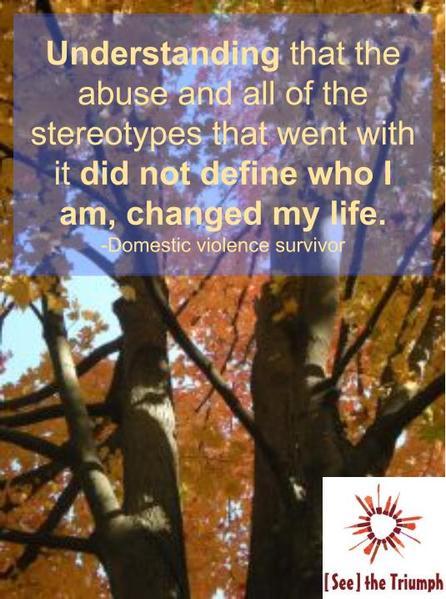
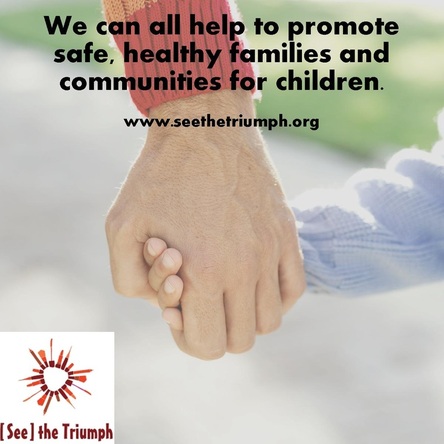
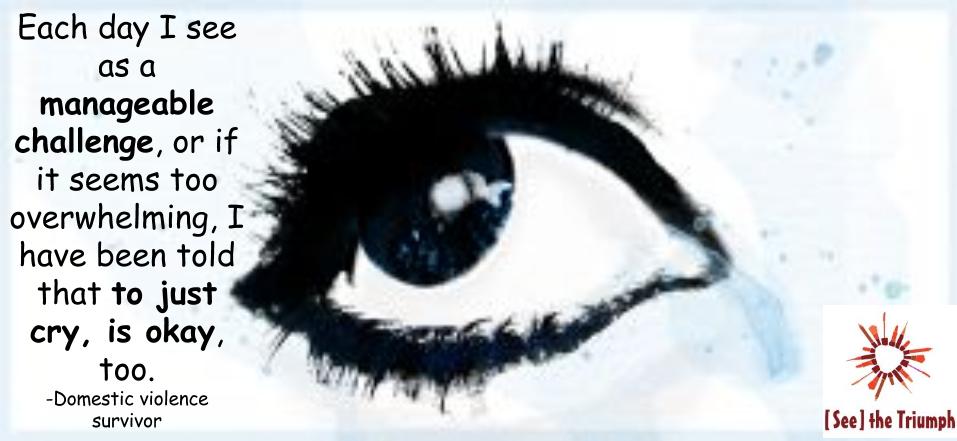
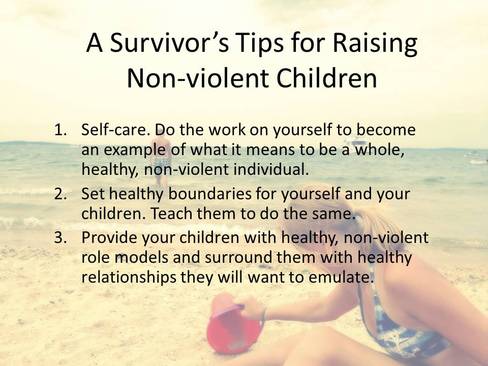
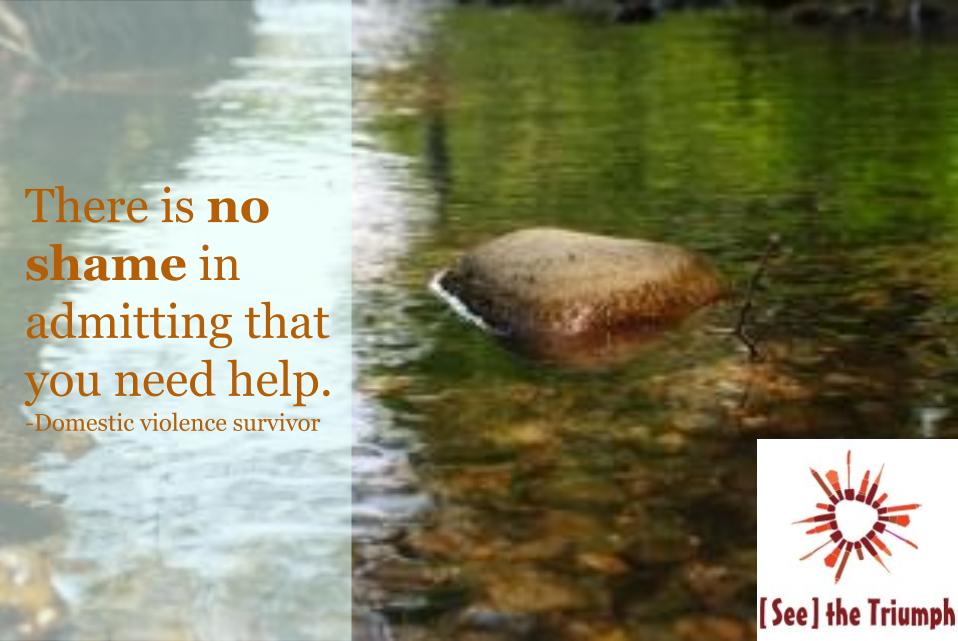
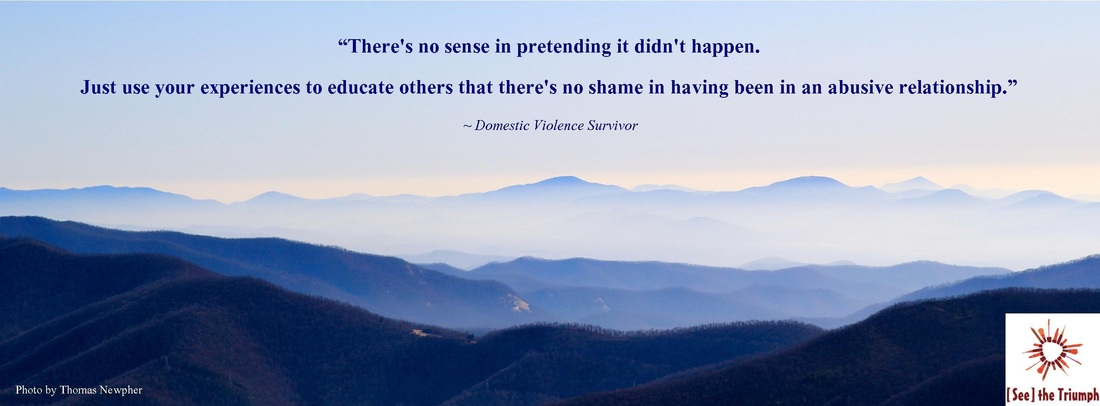
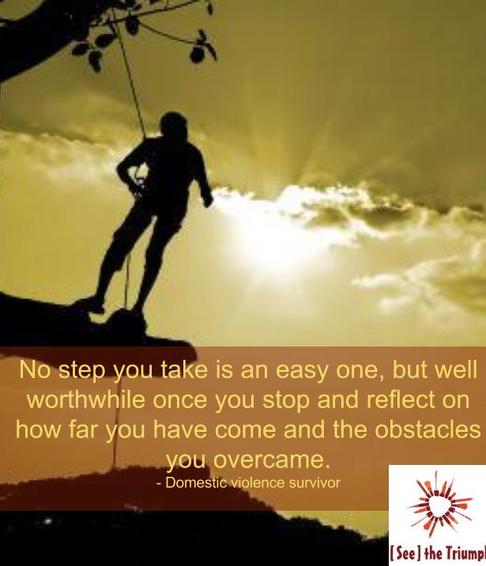
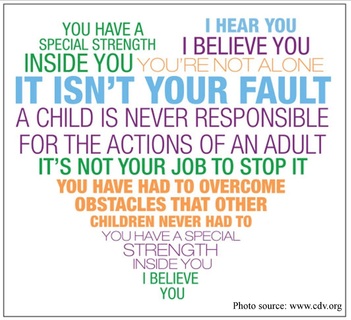
 RSS Feed
RSS Feed